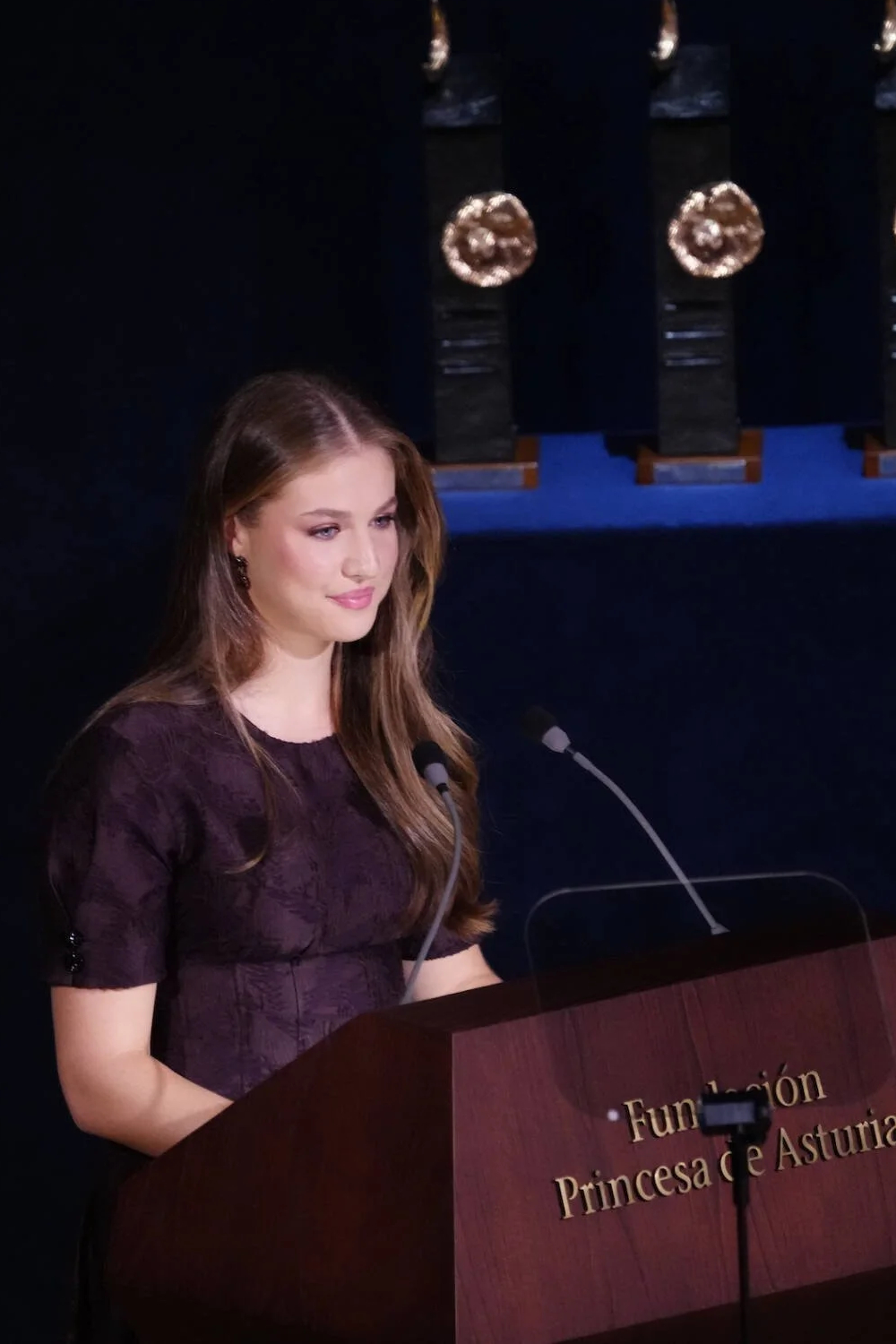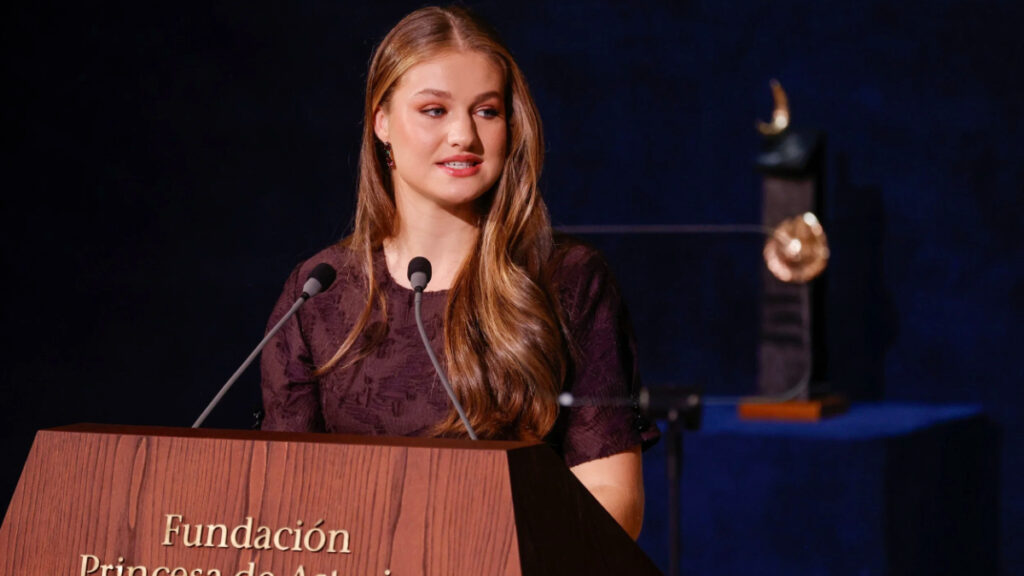Princess Leonor once again took the stage at the Campoamor Theater, and she did so with a confidence that, while no longer surprising, was nonetheless moving. Her speech at the Princess of Asturias Awards was the longest to date, and also one of the most personal.
Those who saw her speak for the first time in 2019 will remember a somewhat nervous teenager; today, however, we saw a future queen with her own voice, capable of connecting with her generation and those before it.

When she described herself as “a Gen Z daughter of an Xer and a Boomer,” she managed to draw smiles, even from her own parents.
While discussing Serena Williams, she admitted that “sisters in crime are our greatest companions on life’s journey.”
She concluded with a powerful message about coexistence and values, reminding us that freedom, justice, and human rights are the true compasses of any society.
Leonor’s full speech at the Princess of Asturias Awards
Majesties, authorities, patrons, ladies and gentlemen, I especially greet this year’s award winners. Welcome to this city, to this principality that, as you have already seen, welcomes you with great affection.Allow me, in these times of immediacy, transience, virtual realities and bits, to write a letter to each awardee. I invite you to join me in this live, spoken postal delivery — a message that brings together paper and pen between the awardees and myself. And I do this because, even though I belong to Generation Z, daughter of one from Generation X and of a baby boomer, I feel that a letter allows one to pause, to go deeper and to think more.And since we live in the economy of attention, let’s see if I can manage to hold yours today. Here I go.Dear Professor Draghi, in 2012, as President of the European Central Bank, you said: “We will do whatever it takes, and believe me, it will be enough.” A phrase that not only calmed the markets but also became an act of confidence in the European project at one of its most fragile moments.Those words contained a message deeper than that of financial stability: the defense of European values, solidarity among nations, and the idea — no less valuable for being oft repeated — that together we are stronger. And I quote you once again: the European Union is above all a mechanism to achieve the goals shared by its citizens — almost 450 million people. It is our best opportunity for a future of peace, security, and independence.The challenges are even greater today, Professor. You know that well.Dear Serena, no one could understand tennis today without you. You transformed it into a faster and more explosive sport, into a way of life in which you had to defy many conventions. The strength with which you always played is astonishing. Your flawless technique, those nearly 30 years as a professional at the highest level, have shown us that greatness is not found in always winning, but in the ability to rise, to learn, and to move forward.And now, as an entrepreneur, you continue to show that your competitive spirit is equally present in life. It’s beautiful what you say about your sister: without Venus there would have been no Serena. Sisterly bonds are our greatest allies and companions on life’s journey.Dear Professor King, we are sorry you cannot be with us this afternoon. Your work led to the identification of a human chromosomal region that harbors a gene whose mutations predispose to breast and ovarian cancer. Later studies by other groups, including your own, led to the discovery and validation of the first of these susceptibility genes for such scientifically, medically, and emotionally significant tumors.But your social commitment has gone even further by contributing your genetic knowledge to help the grandchildren of those who disappeared during Argentina’s dictatorship reunite with their families. I can only imagine the relief felt by so many grandparents.Dear Madelin and Antonio, representatives of the National Museum of Anthropology of Mexico, today we recognize the importance of your institution, which safeguards, exhibits, preserves, and promotes Mexico’s pre-Hispanic legacy and indigenous culture. You have just celebrated your 60th anniversary, although your origins go back 200 years, and you project with strength the pride of a people who look at themselves with dignity and who generously share their great history with the world in an exercise of harmony.I hope someday to have the good fortune to walk through that forest of Chapultepec and admire more than 3,000 years of history — to see the Stone of the Sun and so many expressions of Olmec, Zapotec, Mayan, and Mixtec life. Today, Mexico is very present in this Campoamor Theater.Precisely, dear Graciela, I can’t stop looking at your photograph of that Zapotec woman with iguanas on her head, and I imagine her in that 1979 market in Juchitán, patiently waiting until that woman and her iguanas adopted the form, the expression you wished to capture forever with your camera.I have just said “waiting” and “patience” — qualities that, by the way, are rare these days. That’s why you are a photographer without haste, with the vocation of a writer, a student of cinema, and an avid reader — an artist who has portrayed the strength of women, of the Zapotec woman with iguanas, or of the Seri woman from Sonora, the “Angel Woman” who links the present and the future in that desert.I hope that young people of my generation take the time to contemplate your photographs without hurry.Dear Professor Massey, today we acknowledge your analysis of a phenomenon as current as human migration. The complexity of this issue overwhelms us. You say that immigration entails both costs and benefits, and that the problem is that costs occur disproportionately in the present and at the local level, while the benefits accumulate in the future and at the national level.You have defended this with data tirelessly, placing yourself at the center of political debate, receiving criticism from different ideological sectors, yet always from academic rigor. You have helped rehumanize the view toward those who leave their homeland. Your work allows us to fully grasp the great challenge that many governments face today with immigration.You have dismantled simplistic narratives and formulated migration policies based on data, not disinformation.Dear Eduardo, more than happiness — though that too — you have given me curiosity about words that people of my generation do not know and that I have had to look up in the dictionary. For example: fámula, badulaque, maso, chafarrinón. I can only imagine how the interpreters are managing.After five decades of writing, you have shown that there are debates, such as that between popular and high literature, that you dissolve through the reading of The City of Marvels, The Truth About the Savolta Case, or any of your works.You call yourself a craftsman of words, and you say it with the subtle, mischievous humor of a Barcelonian, tinged with a Cervantine varnish — a bit British, a bit New Yorker — and from now on, I hope, a bit Asturian as well.Your work is essential for knowing more, for understanding more, for pausing the infinite scroll — you know, that endless swiping of the phone screen to which both young and not-so-young are victims.Ultimately, the deep reading of your books leads us to make inferences and deductions, which in turn lead to analysis and discernment of reality — in other words, to a better understanding of the world around us. And isn’t that what it means to be freer?Dear Professor Han, allow me to break your principles for a moment and refer to that emoji on our phones — the one with the exploding head. And now I ask you: if we live in a digital pen, if we have sold our souls to a device, if we are slaves to the screen, if we self-exploit to meet the demands of performance and productivity, and if, through overstimulation, we neglect reflection…If the transcendent slips away from us, if what we believe to be freedom is merely control, how do we — especially young people — recover transcendence so that life is not, as you say, mere satisfaction of needs and the narcissistic display on social networks of an optimism we mistake for true hope, amid the noise of data and information, so far from real knowledge?You will understand, Professor, that we are left feeling like that emoji I mentioned at the beginning of this letter. Let us seek the answer in your thought. The time of haste is uninhabitable; that is why you invite us, among other things, to practice patience, introspection, and above all, deep reading.Having finished my analog tribute in the form of a letter to our awardees, and being aware of the complexity surrounding us and how these men and women have navigated it through their works and their lives, you will surely agree that we must equip ourselves with good tools to face that complexity.So it would not hurt to rekindle enthusiasm, and perhaps we should return to the essentials — to the basics — to respect those who think differently, who are different, to value education, to appreciate our teachers, and to consider our school years as a crucial stage in which everyone — administrations and civil society alike — must engage so that every citizen has opportunities.We must not forget to take responsible and measurable actions for those who have it hardest: for the most vulnerable, for the young who struggle to study, to find work, to build a home; for the elderly who do not wish to be alone; for our children at risk of poverty.Perhaps we should remember what it means to treat others well, to step out of the trench, to shake off fear, to unite in order to do things better, to realize that if we do not look to others, we will not know how to build trust.Coexistence is not easy, but it is the only path to shared progress. It makes sense to care for and defend the values that, as Spaniards and Europeans — indeed, as citizens of any place — define and guide us.To trust in them is to trust in freedom over fear, in justice over arbitrariness, in democracy over intolerance, in the social rule of law over the abuse of power, in human rights over indifference.I am aware that sometimes words spoken from a podium can sound empty, but I also know it is worthwhile to review and remember the nature of our challenges and their solutions, and to insist that there are no magic formulas for managing such complexity.Today, the awardees contribute precisely to rekindling that enthusiasm.Thank you very much.

